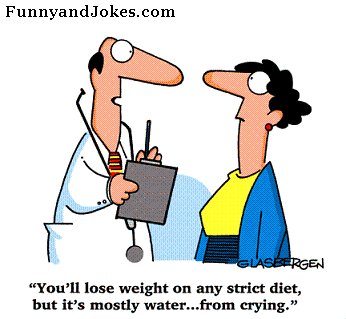“No Guilt” and “Diet” for me do not belong in the same sentence. So imagine my reaction when I opened up my email to find this article, yesterday morning.
As consumers of mass media, please beware of what you read and how what you read affects you personally. I’ve gotten older, I’ve got much more skeptical of the things published by “health” media. Graduate school was a great place to learn how and why you should question research studies and media’s interpretation of such studies. What I learned there has opened my eyes to word twisting, misinterpretation of data, and misrepresentation of findings to suit a catchy title.
Take the article mentioned above for example: Get Slimmer with This No-Guilt Diet. The article focuses on a recent study that grouped women based on five different attitudes about their relationship with food and found (among other things) that one of the groups, the “Guilt-ridden dieters”, were the second highest group according to body fat percentage. After reading the article, I found myself wondering why the author chose such a title. This article isn’t about dieting at all, it is about people’s relationships with food. Maybe I’m reading between the lines, but for me, this article is anti-dieting.
The actual findings of the study, addressed in the article, are pretty revealing of the attitude that causes us to overeat, to have unhealthy relationships with food, and to engage in the cycle of dieting.
- Women who always feel like they’re trying to lose weight (guilt-ridden dieters) are more likely to have a higher percentage of body fat than those focused on nutrition, those who consider themselves creative cooks, or those who were too busy to cook.
- Impulsive eater’s body fat percentage was higher than all other groups.
- Those concerned with nutrition had the lowest percentage of body fat as a group. “They practice restraint in eating, never really letting themselves go, but still feeling their efforts do not always work out,” (Sudo, et al, page 9).
The most interesting thing to come out of this study is the similar attitudes of these women, which allowed for creation of the five different groups. This may allow doctors to treat women based on the group in which they belong, allowing doctors to better tailor nutritional recommendations (and hopefully psychological recommendations) for each patient.
So is this study advocating for a no-guilt diet plan? I don’t think so.

(source)
So what am I taking away from all of this?
1. Question everything you read that is contradictory to your beliefs. You might change your beliefs or your beliefs might be validated. Either way, questioning makes us smarter, it makes us more in-tune with ourselves and who we are. Studies are usually less biased than the media’s interpretation of them. Educate yourself and seek out multiple interpretations of a study if you can’t access it directly.
2. It might be helpful to identify which group(s) you fit into and whether or not you are happy here. I write group(s) because I don’t believe we always fit into neat little bundles. It might be possible that you fit into one group most of the time, but in times of stress, you slide into another. I believe the more we know about our patterns and more specifically ourselves, the better decisions we can make.
For me, dieting causes guilt. When I have dieted in the past I was basically trying to hold myself up to an ideal; an ideal eating plan that is not conducive with my natural eating choices, else it wouldn’t be a diet. Everyone reacts differently to set backs and I can only speak for myself. In the past, I have not bounced back quickly from dieting setbacks. For me, it always felt like failure; proof that I didn’t have what it took to reach the ideal I created in my mind.

(source)
I know for a fact that I used to be a guilt-ridden dieter and now hover between the nutrition focused and the creative cook. However, those guilt-ridden dieter tendencies are still there so I have to address this guilt head-on. It’s helpful for me to know that those guilty tendencies are far more likely to make me overeat than focusing on what my body is telling me and my overall nutrition.
Knowing my weakness is half the battle.
Which group do you fit into? Are you happy there?


